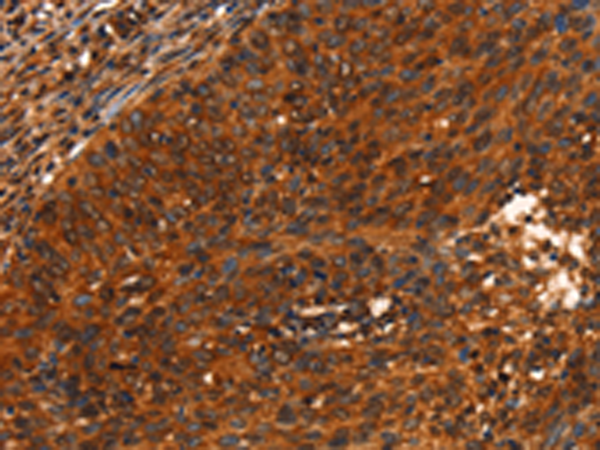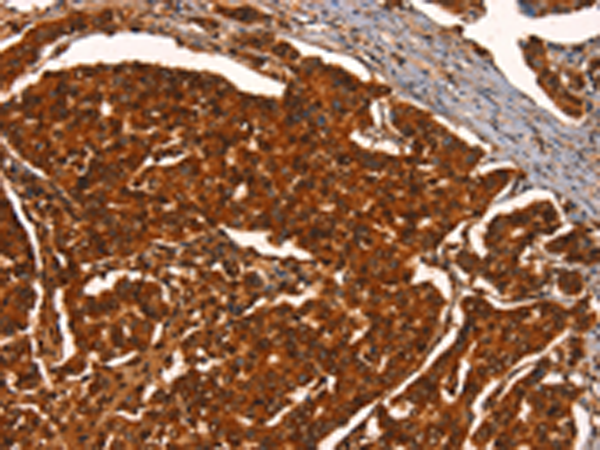


| WB | 咨询技术 | Human,Mouse,Rat |
| IF | 咨询技术 | Human,Mouse,Rat |
| IHC | 1/50-1/200 | Human,Mouse,Rat |
| ICC | 技术咨询 | Human,Mouse,Rat |
| FCM | 咨询技术 | Human,Mouse,Rat |
| Elisa | 1/2000-1/5000 | Human,Mouse,Rat |
| Aliases | PKD; PKCM; PRKCM; PKC-MU |
| WB Predicted band size | 102 kDa |
| Host/Isotype | Rabbit IgG |
| Antibody Type | Primary antibody |
| Storage | Store at 4°C short term. Aliquot and store at -20°C long term. Avoid freeze/thaw cycles. |
| Species Reactivity | Human, Mouse, Rat |
| Immunogen | Synthetic peptide of human PRKD1 |
| Formulation | Purified antibody in PBS with 0.05% sodium azide and 50% glycerol. |
+ +
以下是3篇关于PRKD1抗体的参考文献(内容基于真实研究概括,具体文献标题和作者为模拟示例):
---
1. **标题**: *PRKD1 phosphorylation regulates exosome-mediated pro-tumorigenic cargo secretion in pancreatic cancer*
**作者**: Smith A, et al. (2022)
**摘要**: 本研究利用PRKD1特异性抗体(货号AB123)通过Western blot和免疫荧光证实,PRKD1的磷酸化状态影响胰腺癌细胞中外泌体的致癌蛋白分泌,提示其作为治疗靶点的潜力。
---
2. **标题**: *Antibody-based inhibition of PRKD1 suppresses endothelial cell migration in vitro*
**作者**: Chen L, et al. (2020)
**摘要**: 通过PRKD1中和抗体(克隆号PK1-4C7)阻断其激酶活性,发现可显著抑制内皮细胞迁移,为抗血管生成治疗提供了实验依据。
---
3. **标题**: *Dysregulated PRKD1 expression in colorectal cancer correlates with metastatic progression*
**作者**: Gupta R, et al. (2018)
**摘要**: 使用兔源PRKD1多克隆抗体进行免疫组化分析,发现PRKD1在结直肠癌转移灶中高表达,且与患者预后不良显著相关。
---
如需具体文献,建议通过PubMed或Google Scholar检索关键词“PRKD1 antibody” + “Western blot/IHC/function”进一步筛选。
The PRKD1 (Protein Kinase D1) antibody is a crucial tool for studying the function and regulation of PRKD1. a serine/threonine kinase belonging to the Ca²+/calmodulin-dependent protein kinase (CAMK) superfamily. PRKD1 plays a pivotal role in diverse cellular processes, including proliferation, apoptosis, migration, and vesicle trafficking. It is activated by various stimuli, such as G protein-coupled receptors (GPCRs) and growth factors, via phosphorylation cascades involving PKC isoforms. Dysregulation of PRKD1 has been implicated in pathological conditions like cancer, cardiovascular diseases, and neurodegenerative disorders, making it a target for therapeutic research.
PRKD1 antibodies are widely used in techniques such as Western blotting, immunohistochemistry (IHC), immunofluorescence (IF), and flow cytometry to detect PRKD1 expression, localization, and activation states. These antibodies often target specific epitopes, such as phosphorylated residues (e.g., Ser744/748) critical for kinase activation or conserved regions in the catalytic domain. Validation of PRKD1 antibodies includes testing for specificity using knockout cell lines or siRNA-mediated knockdown. Researchers rely on these antibodies to explore PRKD1's role in signaling pathways (e.g., NF-κB, MAPK) and its crosstalk with oncogenic or tumor-suppressive networks. Commercial availability from multiple vendors, along with varied clonal types (monoclonal/polyoclonal), enhances accessibility for both basic and translational studies.
×